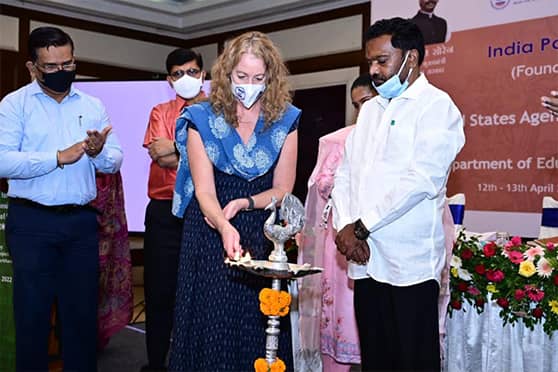Jharkhand government to address kids’ learning needs with help of USAID and CARE India


The Jharkhand government has teamed up with the US Agency for International Development (USAID) and CARE India to launch the India Partnership for Early Learning (IPEL) project to transform the delivery of foundational learning in public schools across the state on Tuesday.
Jharkhand is the second state after Bihar where USAID’s flagship IPEL project will work with CARE India and its consortium partners, Central Square Foundation, KPMG, Room to Read Trust, to support the running of the government of India’s NIPUN-Bharat Mission (National Initiative for Proficiency in Reading with Understanding and Numeracy).
NIPUN- Bharat, launched under the National Education Policy (NEP) 2020, aims to ensure that every child in India gains foundational numeracy and literacy by the end of Grade III.
In Jharkhand, the IPEL project will increase the state government’s capacity to leverage and coordinate financial, human, and material resources, which will increase the percentage of students attaining minimum proficiencies in reading, math, cognitive, and social and emotional domains.
“The US Government, through USAID, is proud to support the state of Jharkhand for this important initiative. Education is a foundational driver of development outcomes. Girls and boys who are prepared with the skills they need for life and work will drive progress for themselves, their families, their communities, and their countries. Through the IPEL project, USAID will implement learning plans for foundational skills in schools, with special emphasis on curriculum design, professional development programs for teachers, digital learning, and inclusive practices,” said Karen Klimowski, deputy mission director, USAID India.
Rajesh Kumar Sharma, secretary, department of school education and literacy, said the partnership comes at a critical time. “Children have returned to school after two years. The primary children are the most affected. We must understand their current learning needs, their capacities and learning ecosystem to ensure that the foundational learning needs of children are met,” he said.
Jharkhand education minister Jagarnath Mahto, who was also present at the event, agreed that addressing the learning needs of children is a need of the hour.
“It is important to make a concrete plan and execute it to address the learning level of children at the school level and to engage with parents in this process. Moreover, it is important to bring quality to government schools as well as to ensure all types of schools impart the same quality of education in the state,” Mahto said.
Debarshi Bhattacharya, chief operating officer, CARE India, said: “CARE and its partners are privileged to launch the IPEL project in partnership with the Jharkhand government and USAID to address foundational learning needs of children using a system strengthening approach in the state”.
The partnership is committed to building a robust and digital system that can be used for effective planning, monitoring and reporting, as well as supporting the state government in developing best of class content and teachers, support approach for foundational learning.
The IPEL project will be implemented in 137 districts, reaching 330,519 Anganwadi centres, 181,528 public primary schools, and more than 66.5 million public school children aged three to eight over five years.